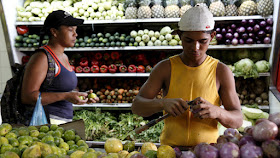It's been too long since I've written a post about Venezuela. Every time I start it seems something new is happening. Yesterday there was a riot in La Vega, a working class district in Caracas. It was about food and people fired guns at National Guard troops (a cross between riot squad, border patrol and army light infantry).
Things are not good and they're not getting better. Most Venezuelans do not have enough to eat, in an oil and mineral rich country governed by people who call themselves socialists. The food shortages started in 2013 soon after the death of President Hugo Chavez when oil, the mainstay of the economy was selling at $100 a barrel. Since then then the price crashed to around $21 a barrel and is now hovering around $40 per barrel.
I was pretty amend angry when I made this video a few days ago and I'm angrier now.
Some of you know my wife is Venezuelan and has family there, people who I spent three months with during the winter of 2014 - 2015. I saw first hand the disconnect between the actual lives of Venezuelans and the Cheerful Charlie reports on state TV and websites purporting to express solidarity with Venezuela ( and presumably it's people.)
Venezuela is a Bizarro sort of place. People who don't have enough to eat have cell phones with Facebook and Whatsapp, so we stay in touch. My wife's people are just short of absolutely desperate. My wife spent a week there after bringing vitamin and mineral pills to her people, two of whom were pregnant, losing weight and anemic.
So when my wife saw Eva Golinger minimize the problem on RT she nearly flipped out.
Poor Venezuelans rummage for edible garbage in Barquisimeto.
This photograph was taken in a supermarket in New York City during the hurricane Katrina crisis in 2011. It was first published as "illustrative" of a food crisis in Venezuela in 2013. In 2013 the price of petroleum was still over $100 a barrel. There were nuisance type food shortages at that time. A shopper might be looking for pasta, for example, but have to settle for rice. Since then the shortages have reached crisis proportions, even if opponents of the government have been exaggerating the situation for years.
It's true that people with enough money can have fruits and vegetables. The problem is that most Venezuelans don't have much money. 60% of Venezuelans are working in the formal economy. 40% of those workers earn minimum wage. 22 minimum wages can buy enough food (excluding all other expenses ) for five people.
These are official Central Bank import figures for Venezuela. Note that Venezuela imports most of its food. In 2007 27,670,659 Venezuelans consumed 570,000 tons of meat. That's around 19 kilos each. In 2015 31,495,633 Venezuelans supposedly consume 590,000 tons of meat. That's around 17 kilos. But these numbers don't tell the story. A gigantic portion of the subsidized imports, around a third according to President Maduro was beingsmuggled out of the country, mainly to Colombia The official and legal border crossings have been closed for months. Yet I can report that family members who live in the border states of Tachira and Zulia are, like their neighbors, in desperate search for food, especially protein rich food, and that meat and other food is now resmuggled from Venezuela to Colombia then back to Venezuela at prices most cannot afford.
There is a new plan, announced by President Maduro, called CLAP, under which the community councils and communes are bringing bags of food door to door. Rioters in Caracas haven't noticed them yet. Residents far from Caracas, in that country some elitists call "Weeds and snakes" ( something like "flyover country"), in Tachira and Zulia and doubtlessly other places too, are awaiting that knock on the door and the appearance of some friendly communards with some much needed eggs, flour and pasta.
As long as the Government and Opposition agree that paying the debt comes first above all else things can only get worse.





No comments:
Post a Comment